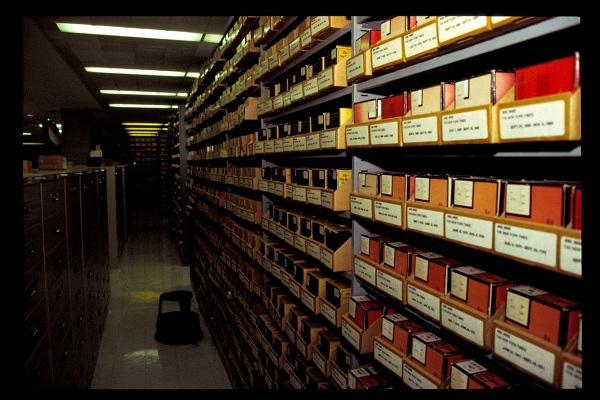
Locked deep within the vaults of Tech’s archives lay the tools of revolution, weapons that overthrew monarchs and dawned a new age of democracy and science. Books and ideas written by authors hundreds of years ago carried the Western World from the dark fog of feudalism into the bright light of intellectual discovery.
Sitting in an ordinary grey box underneath the library is a 324-year old book written by Isaac Newton that introduces for the first time in history his famous theory of gravity: The Philosophiæ Naturalis Principia Mathematica.
The first few rows of the archives are the current Tech science fiction book and magazine collection, which holds over 10,000 unique publications, most of which are the last copies remaining on earth.
The collection was actually begun by Irving Bud Foote, Tech’s first science-fiction scholar and a former LCC professor. Foote donated his personal library, containing first edition works by H.G. Wells, Isaac Asimov and Jules Verne.
The next row contains the entire U.S. official government published records of the Civil War. Dating back to the early 1890s, this anthology of books details every battle, manifest, letter, speech and legislative record of America’s bloodiest war.
Far from entertainment and fiction, the archives hold immeasurable resources for research on any topic.
Locked away in a hermetically sealed room closed to the public is Tech’s rare book collection. The moisture and temperature are strictly controlled to ensure the longevity of prized historical possessions.
Among the influential literary works stored there are Rene Descartes’ Philosophica published in 1656, Gottfried Leibniz’s Combinatoria from 1690 and Blaise Pascal’s treatise on his triangle theorem from 1665.
So delicate are these books that one fears that opening them all the way will break the bindings. Though they are old, their pages are crisp and clear due to advanced preservation methods. The full-page colored pictures retain their original shine and detail, and the volumes do not appear as though they were hand-crafted centuries before.
Conservation is not the only reason to keep these books behind closed doors. Newton’s Principia is valued at approximately $285,000.
The most expensive item in the archives is a small collection of nine atlases from 1664, which is collectively valued at a total of $400,000. These atlases actually only contain pictures of bridges, but their age and condition have increased their value almost 1000 times.
In fact, any otherwise common object is worth more due to preservation.
Aside from books, the archives hold old RAT caps, footballs, letters, pins and even a ceremonial British sword. At the bottom of one shelf, sitting plainly in a box, is a vase created in Picasso’s studio. Two Oscars won by a Y. Frank Freeman are in another box in the same room. The 1996 Olympic Torch from the Atlanta games is also located here.
The library reserves are not only a bookcase for history, but also an ark for Tech and Atlanta culture.
The first T-Book ever published is found in the Library Archives as well.
About five inches tall and not much wider than a credit card, this booklet contains, as always, the words to the fight song, a synopsis of Tech’s history and a football schedule for 1909.
When Tech was an all-male school, it had regulations for attire proper for a “gentleman” and instructions for RAT cap usage.
At the time, Tech was a trade school, and experience in the shop was required for all engineering students. Thus, the freshman class was then commonly referred to as the “apprentice class,” according to the first RAT book publication.
Although seemingly out of reach to the average student, a tour of the Library Archives only requires an appointment made in person or online. The research collections are open to everyone for academic use.
